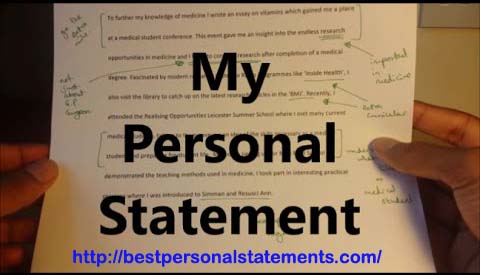Applying to graduate school abroad can be a significant step towards your academic and professional goals. After identifying a few graduate programs to apply to abroad, the next step is to start the application process—which includes writing a personal statement.
Universities abroad require students to include personal statements in their applications. You probably have plenty of questions about personal statements. In this article, we’ll answer your questions to help you write a compelling personal statement.
What Is a Personal Statement?
A personal statement is a short essay that introduces you to the graduate school admissions committee. It explains why you’re a great candidate for the program, highlighting your interests, achievements, experience, and aspirations.
Remember, there will be many qualified candidates applying to competitive graduate programs—each of them with impressive grades and test scores. A personal statement gives you the opportunity to make a case for yourself on why you’re an exceptional addition to the program.
A personal statement answers the following questions:
- Why is the program right for you?
- How will the program help you contribute to society?
- Why is the program the next logical step in your academic/professional growth?
Is a Personal Statement the Same as a Statement of Purpose?
You might be wondering “What is the difference between a personal statement and a statement of purpose?”
Well, there are slight differences between the two.
- Statement of purpose: It focuses on your reasons for applying to that specific graduate program. It may address topics such as career and research goals, how your academic achievements qualify you for the program, and how the program will impact your future.
- Personal statement: Typically, a personal statement gives the student more freedom in terms of form and content than a statement of purpose. It’s intended to give the graduate schools admissions committee a glimpse into the applicant’s personality. The essay contains specific, self-reflective anecdotes detailing past experiences, goals, and interests.
For some graduate programs, both of these essays fill the same need. However, there are cases where you’ll be asked to provide both a statement of purpose and a personal statement.
How to Write a Compelling Personal Statement
As we’ve noted, personal statements give applicants freedom of style and form. Therefore, good personal statements can come in many forms and styles.
That said, the most compelling personal statements share the following elements:
Have a Clear, Compelling Narrative
An effective personal statement must communicate a clear message to the graduate school admission officers. Before you start writing, plan out the key points you want to include in the essay. Then start thinking about how you can best communicate these points.
Your narrative should be tightly focused on what you bring to the table that makes you an outstanding candidate.
Explain how your experiences, interests, and preparation make you a good fit for the program, and why the program is a great fit for you. Highlight specific things about the program that appeal to you and how you’ll take advantage of the resources and opportunities offered.
Provide Specific Examples
When highlighting your experiences and skills, avoid using general statements.
To pull in the reader, tell specific stories that show your passion. Such stories connect with the audience and make them start caring about you.
For instance, if you’re applying to medical school, a personal story about your experience volunteering in a hospital would be great. The story should focus on an experience that changed your worldview or challenged and confirmed the intention to pursue your goal.
Address Potential Shortcomings
What if you don’t have impressive grades? A personal statement provides you the opportunity to plead your case.
Use the personal statement to provide context on your challenges and achievements. For instance, your bad grades could have been due to suffering ill health.
However, exercise caution when explaining weak points. You run the risk of coming off as if you’re making excuses. Frame your explanations to demonstrate perseverance, improvement, and growth.
Are Concise and Precise
Personal statements are typically short—about 500 to 1000 words. Make every word count.
Filler words and phrases, such as “the truth is” or “it’s my personal belief that” shouldn’t feature in your essay. They only take up valuable space and weaken your writing.
The goal is to communicate your points with concision and precision. Even if the statement allows for longer word counts, bear in mind that more isn’t always better.
A rambling personal statement is likely to be skimmed rather than thoroughly read by admission officials.
Have Appropriate Boundaries
While a personal statement allows you freedom of style and content, it’s important to maintain appropriate boundaries.
Don’t overshare about your relationships, bodily functions, or personal experiences. For instance, sharing about struggles with mental health can make you seem unstable and a risky investment.
Similarly, be cautious with humor. There’s a risk that the audience might not share your sense of humor. Some jokes might also come off as offensive. When in doubt, err on the side of caution.
Demonstrate Strong Writing
While it isn’t a writing competition, it’s important that your personal statement shows strong writing skills. Even in technical fields, you’ll often be required to write test and research papers. A well-written personal statement demonstrates that you’re capable of writing these papers when necessary.
Your essay must clearly articulate your points. While creativity is appreciated, avoid going over the top. For instance, writing your personal statement as a faux legal brief when applying for law school might make your personal statement stand out in the wrong way.
After writing, proofread your essay to remove any grammatical, spelling, and punctuation errors. Have someone else proofread your personal statement before submission.
What to Include in a Masters Personal Statement
A personal statement helps the graduate school admission officers to decide if you’re the right fit for the program.
With that in mind, here are some key elements to include in your personal statement:
- Why you want to study abroad and in the specific country
- Why you want to study in that specific program
- Your long term career goals
- Relevant work experience (including internships and volunteer experiences)
- Your extracurricular activities
The Structure of a Personal Statement
There is no ideal format for a personal statement. However, it’s crucial to have a coherent framework to ensure that your essay contains all the key elements admissions officers will be looking for.
This general outline of the structure of a personal statement might come in handy:
- Introduction
- Academic record
- Engagement in the field
- Professional experience and skills
- Extracurricular activities
- Conclusion
How Long Should a Personal Statement Be?
In many cases, the length required for a personal statement for a graduate program will be explicitly stated.
Check the application guidelines for the length of personal statement before you begin writing.
If the required length isn’t indicated, it’s advisable to stick to the standard length of around 500 to 600 words.
Examples of Personal Statements
Now that you know what a personal statement is and how to write one, you must be eager to check out some samples:
Here are links to samples of successful personal statements:
- Medical School Personal Statement Sample
- The University of Chicago Law School Personal Statement Samples
- California State University Personal Statement for Graduate School Samples:
- Penn State University Graduate Personal Statement Samples
Are you looking for scholarships or student loans to finance your education abroad? Find a scholarship through our extensive scholarship database and compare different loans on the 8B student loan marketplace.



